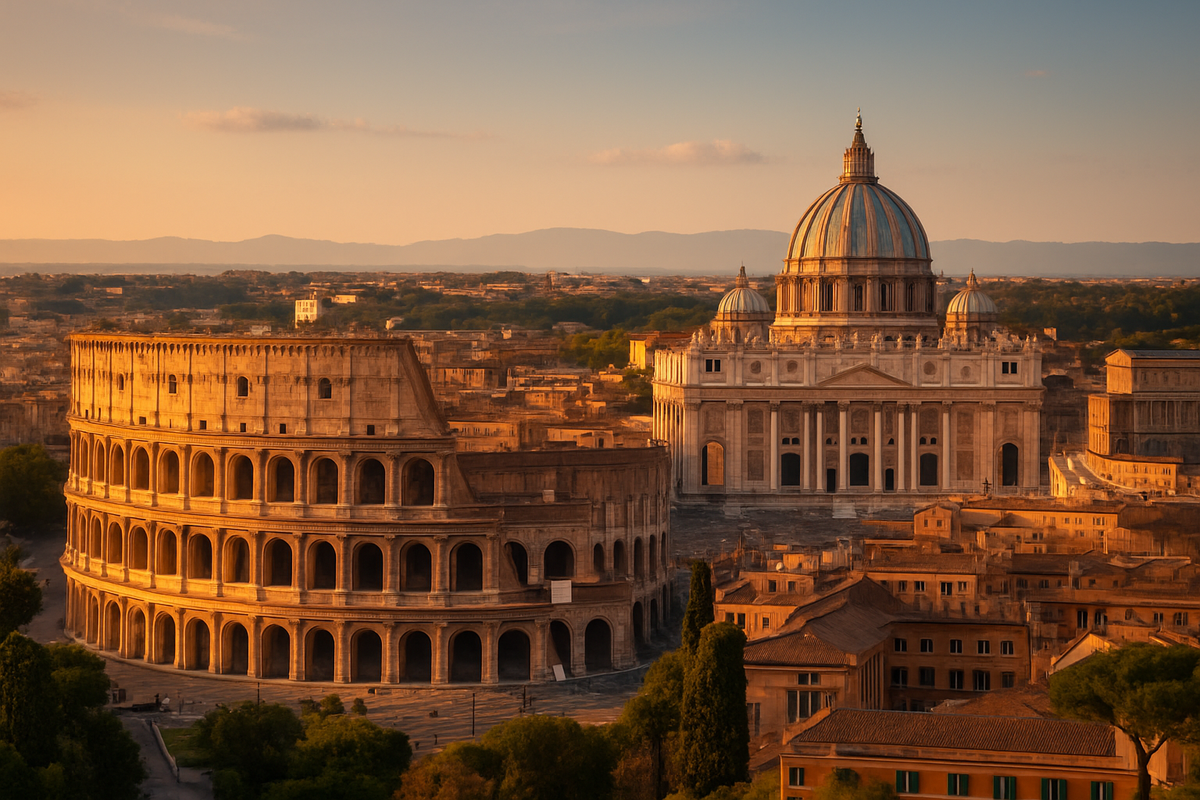Rome on the Horizon? Trump Floats Neutral Ground for Putin–Zelenskyy Talks
As Trump proposes Rome as neutral ground for a Putin–Zelenskyy summit, the Eternal City emerges as a symbolic stage for peace talks. But will it deliver genuine diplomacy or simply another spectacle in global politics?

Diplomatic history is often written not just by what is said, but where it is said. From the secretive backrooms of Yalta to the grandeur of Geneva, neutral grounds have long been the stage for world-shaping agreements. Now, in a dramatic twist in global politics, former U.S. President Donald Trump has floated the idea of Rome serving as the site for an unprecedented meeting between Ukrainian President Volodymyr Zelenskyy and Russian President Vladimir Putin.
The proposal, equal parts audacious and theatrical, raises a single, burning question: is Rome truly on the horizon or is this yet another act in the ongoing drama of international diplomacy?
A Stage Worthy of Drama
Rome has always carried an aura of symbolism. The Eternal City, home to centuries of empire, Vatican diplomacy, and political intrigue, is no stranger to hosting dialogue. Choosing Rome as neutral ground would not only be a geographical middle point but also a symbolic gesture of stepping into a city associated with both spiritual authority and political gravitas.
To imagine Putin and Zelenskyy sitting across a table in Rome, flanked by Trump and perhaps other European figures, is to picture diplomacy cloaked in spectacle. And Trump, who thrives on spectacle, knows this better than anyone. For him, the optics are as important as the outcome if not more.
Why Neutral Ground Matters
Neutrality in diplomacy isn’t just geography it’s psychology. For two leaders locked in a bitter and bloody conflict, even the venue is a battlefield of symbolism.
- Kyiv would signal a Ukrainian upper hand.
- Moscow would scream Russian dominance.
- Washington or Brussels would imply Western intervention.
But Rome a city that has been historically outside the direct combat lines might strike the right balance. Italy, while part of NATO and the EU, is not seen as aggressively hawkish in the conflict. That makes Rome an intriguing, if delicate, option.

Trump’s Calculated Gamble
For Trump, suggesting Rome isn’t just about logistics it’s a calculated political gamble. He has long branded himself as a dealmaker, someone who can cut through decades of animosity with a handshake and a headline. By floating Rome, he positions himself as the architect of peace, a man staging diplomacy on his own terms.
It’s worth noting that Trump thrives in environments that look like grand productions. A summit in Rome, with global press, iconic backdrops, and the scent of history in the air, would provide exactly the kind of theater he enjoys. In his vision, the city becomes not just neutral ground but a stage set for him to re-emerge as a global negotiator.
Zelenskyy’s Calculus
For President Zelenskyy, agreeing to Rome would be both a gamble and an opportunity. On one hand, meeting Putin in any neutral space risks the perception of giving legitimacy to Moscow’s aggression. On the other hand, refusing the opportunity could make Kyiv look inflexible at a time when the world craves even the faintest whiff of peace.
Rome might give Zelenskyy cover. By framing the summit as happening under Trump’s initiative in a European capital rather than on Russian terms, he could attend without appearing to bow to Moscow. The city’s symbolic neutrality allows him to walk the tightrope between defending Ukraine’s sovereignty and signaling openness to dialogue.
Putin’s Perspective
For Vladimir Putin, the choice of Rome carries its own layers. Moscow has often criticized summits dominated by NATO-heavy venues, painting them as biased arenas. Rome, though within NATO’s umbrella, might feel less aggressive compared to Brussels or Berlin.
Putin also understands the value of optics. Sitting at a table in Rome would project him not as an isolated autocrat but as a world leader still courted for dialogue. The setting would soften the image of a Russia cornered by sanctions and condemnation. For Putin, Rome could offer a return to legitimacy at least in the theater of international politics.
The Symbolism of Rome
Rome is not just another European capital. It is the seat of the Vatican, whose history of diplomacy stretches centuries. Popes have mediated conflicts, acted as moral referees, and opened their palaces to warring sides when no one else would.
Trump floating Rome might unconsciously (or perhaps deliberately) tap into this history. By invoking the Eternal City, the proposal resonates with imagery of peace, reconciliation, and history-making. Imagine the headlines: “From War to Dialogue: Rome Hosts Putin–Zelenskyy Talks.” The setting itself could become part of the peace narrative.

Risks of Spectacle Over Substance
Yet, as with all things Trump, there is the risk that the spectacle could eclipse the substance. A meeting in Rome could devolve into photo ops, press conferences, and dramatic handshakes without producing meaningful agreements. Critics would argue that staging such talks only legitimizes Putin while leaving Ukraine’s sovereignty at risk.
History is littered with summits that looked promising but delivered little. Without a clear framework, Rome could become another entry in that list.
Europe’s Role
Rome may be floated as neutral ground, but Europe itself is not a neutral actor. Italy, while supportive of Ukraine, has often pursued a softer line compared to its Northern European neighbors. This makes Italy a curious but perhaps fitting host neither too aggressive nor too detached.
European leaders, however, would likely push for Rome to be more than a backdrop. They would want guardrails, conditions, and assurances that a summit would not simply serve Trump’s political theater or Putin’s propaganda. For Europe, Rome must not just be symbolic it must deliver.

The Global Reaction
The world would watch a Rome summit with bated breath.
- Allies of Ukraine would hope it signals progress without conceding too much.
- Russia’s partners would seize the chance to argue that dialogue is still possible.
- Global citizens, weary of war headlines, would cling to the possibility that peace might emerge, even if faintly.
But the reaction would also be mixed. Many would question Trump’s motives, Zelenskyy’s risks, and Putin’s sincerity. The debate would swirl: is Rome a path to peace or just another performance in global politics?
A City Built on Compromise
Rome has endured empires, collapses, renaissances, and revolutions. Its very stones speak of compromise, adaptation, and survival. Perhaps that makes it the perfect stage for a modern conflict rooted in history, pride, and survival.
The city’s role in this unfolding narrative is not guaranteed. Trump may be floating Rome as an idea, but whether it materializes depends on the willingness of three men with vastly different stakes:
- Trump, seeking relevance.
- Zelenskyy, seeking security.
- Putin, seeking legitimacy.
If they all converge, Rome could witness one of the most dramatic diplomatic encounters of the century.
Conclusion: Rome as Horizon or Mirage?
The idea of Rome as the stage for a Putin–Zelenskyy summit is as captivating as it is uncertain. It carries history, symbolism, and theater, but also risks, skepticism, and the potential for hollow gestures.
In the end, the horizon may hold Rome, but whether it will be a beacon of peace or a mirage of diplomacy depends less on the city itself and more on the leaders who would gather within it.
For now, the Eternal City waits its ruins whispering of empires past, its basilicas echoing with prayers for peace, and its piazzas ready to host yet another chapter in humanity’s endless dance between conflict and compromise.
Sources:
- Al Jazeera: Reports that President Trump has proposed a summit between Putin and Zelenskyy, coordinating with European partners and U.S. envoys. Al Jazeera
- Politico: Notes that Trump hosted Zelenskyy and European leaders at the White House and is taking initial steps to arrange a Zelenskyy–Putin summit. Politico
- Wall Street Journal: Highlights Trump’s newfound openness to offering U.S. security guarantees to Ukraine, with a proposed trilateral summit in play. The Wall Street Journal
- The Guardian: Covers key takeaways from White House summit, including that Trump is arranging *a meeting* between Zelenskyy and Putin. The Guardian+1




